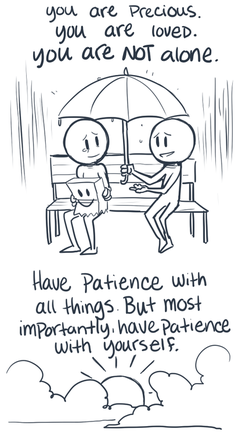 A conversation between a father, a mother and a doctor about their daughter's struggle with Depression that doesn't end in a mutual understanding between the three, but stands to highlight the problems accompanying Depression and how it is commonly stigmatized as 'an undesired state of mind ', and how a misunderstanding like that adversely affects both the sufferer and a scientific-eyed but sensitive doctor. “So you’re saying medical treatment is the only way to go, Doctor?” “Mrs Dean, I’m a man of science, and for me it is certainly the best way to go given your daughter’s symptoms. My recommendation would be medication alongside long-term psychotherapy for Mia.”, replies Max. Silence from Mr Dean while Mia gazes out the window. “And what if we weren’t fortunate enough to be sitting across from you for “your highly valued” opinion?”, scorns Mrs Dean. “Mrs Dean, this is in the best interest of your daughter, who by the way…” “Doctor, that’s enough. I just want to know how you’ve based your diagnosis? What made you pen down Depression in that prescription?” “Mrs. Dean, based on what your daughter has communicated to me, and based on her doctor’s advice back in America...” “What are the symptoms, Doctor?! I’m not interested in what any other doctor has to say; I’m only interested in your advice for my girl.” “Mia, would you please tell your mother?” Mia is agitated now, frustrated at her mother’s unwillingness to listen to the doctor. “I have said this before and I’m saying this now, mum. I have started losing interest in daily activities. While on anti-depressants back in America, I felt like I could achieve things. I felt the difference. I was in a mood to do things, instead of just lying in my bed like I do now! You saw my performance dip in the final year of high school. I was a straight A student until 11th grade, and suddenly final year, my performance went crashing down – I just did NOT FEEL UP TO STUDYING. And I knew I wasn’t being me in feeling so. So if it wasn’t me, it had to be Depression! Doctors are trained professionals, mum. They know what they’re talking about.” “Mrs Dean, we are psychiatrists. Your daughter needs your help and your consent to be able to go back on anti-depressants. Give it a year, and I promise you she will come out feeling a whole lot better. This is truly just a chemical imbalance in the brain that can be and must be treated to avoid further repurcussions of the disease. ” “What about physical and recreational activities? Those are also well-known solutions. “ chimes in Mrs Dean. “Why can’t Mia indulge in activities that would help her regain interest in everyday life? She should be advised to go out and make friends instead of popping pills!” Mia looks at her mother in dismay. Max notices. “Mrs Dean, physical activity is definitely a must when dealing with mental disorder of the nature of Depression. But do you really think she’s not trying? Do you really think she hasn’t been making an effort for two straight years? Mrs Dean, your husband is also seated among us and in my last meeting with Mia and your husband, I emphasized the similarity between a disorder like Depression and one like Diabetes. Just like diabetes should not and must not be left untreated, so is the case with Depression. The difference is only that one has direct and visible physical that relate the body and how one feels physically and the other concerns mental health and how one feels mentally.” “I have told you what I believe, Doctor! Medication is not an option for Mia’s problem. I have my hiccups and stigmas about medication in this regard and fully know that Mia doesn’t even need it. Now, if you could please take back this prescription and refund our money for this session? That would be very kind of you. We’re done here.” The word “WOW!” is all that manages to escape from Mia’s mouth. She knows she has lost this battle to her mother. She is not sure how to gather the courage to stand up to her at this point, because in three days’ time she’ll be flying away to a wholly different country where she won’t have her mum or dad, just like last semester of college and she feels responsible for how she leaves things with her mother. She is sure she can’t make her mother’s warped mind see reason because her mother has completely given in to the social stigma that surrounds Depression and any medical treatment that goes with it. Max now looks over at Mister Dean rather disappointingly. Mister Dean, who has stayed quiet throughout this conversation, can feel his stare on him. Max now speaks directly to Mister Dean. “Would you at least agree that I’m talking sense, Mister Dean? Did you not tell your wife you agreed with me in our last conversation, that I spent an hour talking to you guys?” Mister Dean, unable to meet the doctor eye to eye, utters in a rather faint tone “I…Doctor, I uh…”, finally submitting “Yes, I agree that you’re making sense.” The doctor picks up his pen and asks for the prescription. Mia has it hidden from the doctor to show disapproval of her mother. Mrs. Dean softly pulls it away from her hand and puts it in front of the doctor. Mia stays silent. “It is very disheartening. We are trying to help your daughter here, Mrs Dean.”, the doctor laughs solemnly. “It is very disheartening to see you are unable to help her. But here you are… “ And with a heavy heart, Max stamps the paper, granting the refund. Despite being a good-willing doctor, the Harvard scholar has lost in his effort to convince his patient’s family. Reason has lost to stigma. -Anonymous Resources on UIUC campus: The Counseling Center and McKinley Health Center Paraphrasing from the source: http://www.thelancet.com/journals/lancet/article/PIIS0140-6736(12)61457-3/abstract “Stigmatising attitudes, either their own or those of other people, are often nominated as an important issue of concern by individuals with mental disorders and can have several adverse effects, including delayed help seeking, difficulties with personal relationships, and disruption to educational and vocational goals.”
1 Comment
|
AuthorAnonymous ArchivesCategories |
- Home
-
Articles
- Aggregation
- Breaking Down Mental Illiness
- Overcoming Domestic Abuse
- Children and Media
- The Continuous Fight for a Transformed University
- Not Everyone is Born Equal
- COPING WITH RACE-RELATED STRESS
- Stress Tips
- Diversity Qualifications
- When Girls Go For It...
- Untouched Topics of Domestic Violence
- The Human Library
- Selective Sympathy for Terrorism
- From Margin to Center
- Freedom of Speech = Safe Space?
- All About Audrey
- Thank God It's Natural CEO Chris-Tia Donaldson
- Young Voices
- Features
- Podcasts
- Resources
- ABOUT
- Cajun Chicken Linguini Alfredo
- Custody Battle Ground: Kansas Kids
|
Some names and identifying details have been changed to protect the privacy of the individuals and their families. ACE, Active Centralized Empowerment and Inc. cannot be used without the written permission from Dr. Janice Marie Collins.
|

 RSS Feed
RSS Feed